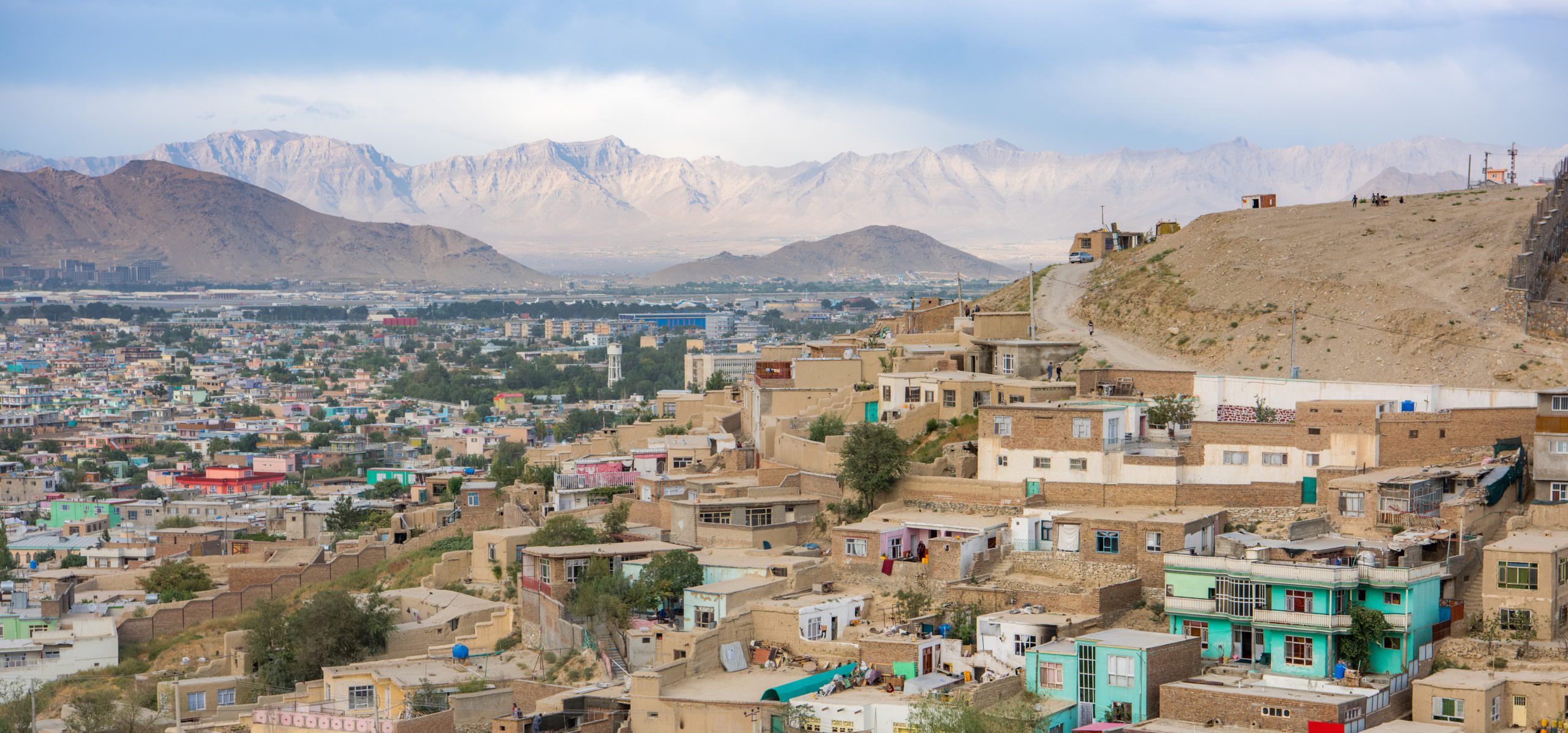
Kabul, Afghanistan. Adobe photo.
Fara Abbas, a Fellow with the Negotiation Task Force, based at Harvard’s Davis Center for Russian and Eurasian Studies, is a specialist on Afghan affairs with over 10 years of in-country experience on security, peace, and development. She fled Afghanistan in August after the Taliban takeover, and a stipend by a number of Harvard entities – including the Mittal Institute – is supporting her year-long Fellowship at Harvard.
Prior to her role at Harvard, Fara served in senior government positions, representing Afghanistan in international negotiations and conferences. Most recently, she served as director of programs, and previously deputy director general for international relations at the Office of National Security Council, where she advanced the government’s foreign and security policies. She’s a graduate of Stanford University with an MA in International Policy Studies with a focus on international security and cooperation.
The Mittal Institute sat down with Fara to learn more about her journey to Harvard, and her current research projects.
Mittal Institute: Fara, welcome to Harvard. I know your journey here was arduous – you fled Afghanistan for a refugee camp in Qatar, before coming to Cambridge. Can you expand a bit upon your experience for our community?
Fara Abbas: Yes, I’d be happy to. The first few days after the takeover were surreal. We were in complete shock and the situation was chaotic. It all happened so suddenly, and everyone was caught off guard. Just as it happened in Ukraine.
My husband and I initially decided to move house in case the Taliban came looking for us. Which they did later on. We had both been working at that point for the government’s security sector. The day we were supposed to move, my friend from the US embassy called and said I should come to the airport now. It was clear to us that we had no other option than to leave. Our lives would be under threat – the Taliban are infamous for their brutality.

Fara Abbas, a Fellow with the Negotiation Task Force.
As soon as I entered the airport, I broke down. I cried for the country, for our people, for all that could have been, for our potential, for my home, my family… (it makes me emotional even today). We had come so far and achieved so much. And it was all gone.
At the same time, I was relieved that we were now safe.
We were brought to Qatar first. By the time we left Doha two weeks later, the camp population had doubled. We then traveled to the US and were housed in a Marines base. The journey was emotionally arduous for all of us. We were all mourning the loss of our home, not knowing if we would be able to see it again, worried about friends and family left behind, uncertain about the future.
It took us a couple of weeks to get out of the Marines’ base and come to Cambridge. Our arrival in the US was so unplanned and sudden that the first couple of months were overwhelming. I remember being exhausted all the time. Our minds were on overdrive trying to make sense of our new reality while coping with all that happened. It all still feels like a nightmare.
Mittal Institute: You have spent your entire professional career in civil service. What led you on your career path, and what research are you focused on while here at Harvard?
Fara Abbas: I went into civil service because I wanted to make a difference – to help Afghanistan develop so it breaks free from the cycle of poverty and conflict. I don’t know how much of a difference I made, but I enjoyed my work. I got to work on some very interesting projects – from negotiating regional economic cooperation to formulating foreign and security policies. There was also never a dull moment. Coming to terms with losing the achievements of the past two decades has been the hardest for me.
At Harvard, my research focuses on the new complex conflict and negotiation environment in Afghanistan with the Taliban in power. The former Afghan government spent nearly a year trying to reach a power-sharing agreement with the insurgent group. Those negotiations failed to produce a deal that could have formed a new coalition government and a stable political order. My research will be looking at the various national, regional, and international actors, and their key interests, alliances and rivalries to help understand the new sets of challenges to negotiations on peace and stability.
I went into civil service because I wanted to make a difference – to help Afghanistan develop so it breaks free from the cycle of poverty and conflict. I got to work on some very interesting projects – from negotiating regional economic cooperation to formulating foreign and security policies. Coming to terms with losing the achievements of the past two decades has been the hardest for me.
Mittal Institute: Many of us read about the collapse of Afghanistan – you lived it. Were there early warning signs of the Taliban takeover, or did it come as a surprise to you?
Fara Abbas: It was both. There were signs it was coming, but it was also a shock when it actually happened.
I think everything changed last April when President Biden announced total US withdrawal by September 11. Before then, the Afghan government thought Biden would reverse Trump’s Doha deal. When it became conclusive that Biden will not, the security forces lost morale. The Afghan leadership tried to continue the fight without critical US support through the early summer, but eventually learned the hard truth. The forces did not want to fight, they were poorly coordinated, and there was no strategy. Corruption had hollowed the government.
The insurgency made rapid advances through the late spring and summer, often capturing territories without a fight. Their advances were so quick that even foreign intelligence reports couldn’t keep up. In early summer, the intelligence predicted 9 to 18 months until the Taliban takeover of Kabul. By late summer, they predicted three months. Days before Kabul’s fall, they predicted 30 days. No one saw it coming as swiftly as it did.
Mittal Institute: It has been roughly six months since the Taliban’s takeover. It has been reported that the Afghan people face a humanitarian crisis after the collapse. In your opinion, where does the country go from here – what should the international community focus on in terms of helping Afghanistan stabilize?
Fara Abbas: The situation is unfortunately very dire. The most urgent priority is to address the humanitarian crisis.
The international community should take any conceivable measure to prevent the looming humanitarian disaster. The US, UN, and others have come up with some creative solutions to help mitigate these challenges in a way that limits undue benefits to the Taliban. For instance, UNICEF just announced they will pay teacher salaries. The IRC has been distributing cash to those in need. The World Food Programme (WFP) has been distributing food.
But these are temporary solutions and not sustainable. The second urgent priority should be to help stabilize the economy that is suffering from severe lack of liquidity. The US government is currently working on designing and setting up temporary financial mechanisms that allow the country to receive some of their foreign reserves to recapitalize the financial system without lifting sanctions on the Taliban leadership. The Treasury Department’s recently issued general licenses that authorize transactions involving Afghanistan and its governing institutions that would otherwise be prohibited by US sanctions. These are all measured steps in a positive direction.
Mittal Institute: You recently moderated an insightful panel on “Afghanistan After the Collapse: Where Are We Now, and What Comes Next?” which explored the political, economic, and security developments of Afghanistan under Taliban rule (Listen to the Davis Center talk here and watch the video below). What are some talking points that you can share from the discussion, and do you plan to host future events on Afghanistan for the Harvard community at large?
Fara Abbas: I think we should not lose sight of the magnitude of the humanitarian crisis. A lot of people are suffering. The world shouldn’t abandon Afghanistan in these critical times.
Separately, we know so little about the Taliban. They are a secretive organization, but what we have come to learn is that there are various voices within the group. These elements or factions have differing positions on issues. But they have managed to remain united and cohesive so far. The limited knowledge about the group and its vision together with other relevant factors, such as regional policies, make predictions on the future of Afghanistan very tough. I completely agree with Andrew Watkins who said that Afghanistan is the graveyard of predictions.
I plan on hosting another event in April. It will focus on Afghan women and their lives under the Taliban regime. Girls beyond grade six aren’t allowed to go to school. The Taliban have just lifted the ban on women and men attending university, but there aren’t many professors left in the country to teach. Women aren’t allowed to work. The group newly announced women aren’t allowed to travel alone. These restrictions are akin to a gender apartheid. Many brave women continue to protest these draconian policies. Many of them were arbitrarily detained. Together with a spectacular panel, I will discuss what awaits girls and women in Afghanistan and what can be done to amplify their voices.
Mittal Institute: What is next for you – what are your future plans following your Fellowship?
Fara Abbas: I want to continue working in my field and remain involved in Afghanistan and the region. Aside from that, I will focus on building a life for us here.
